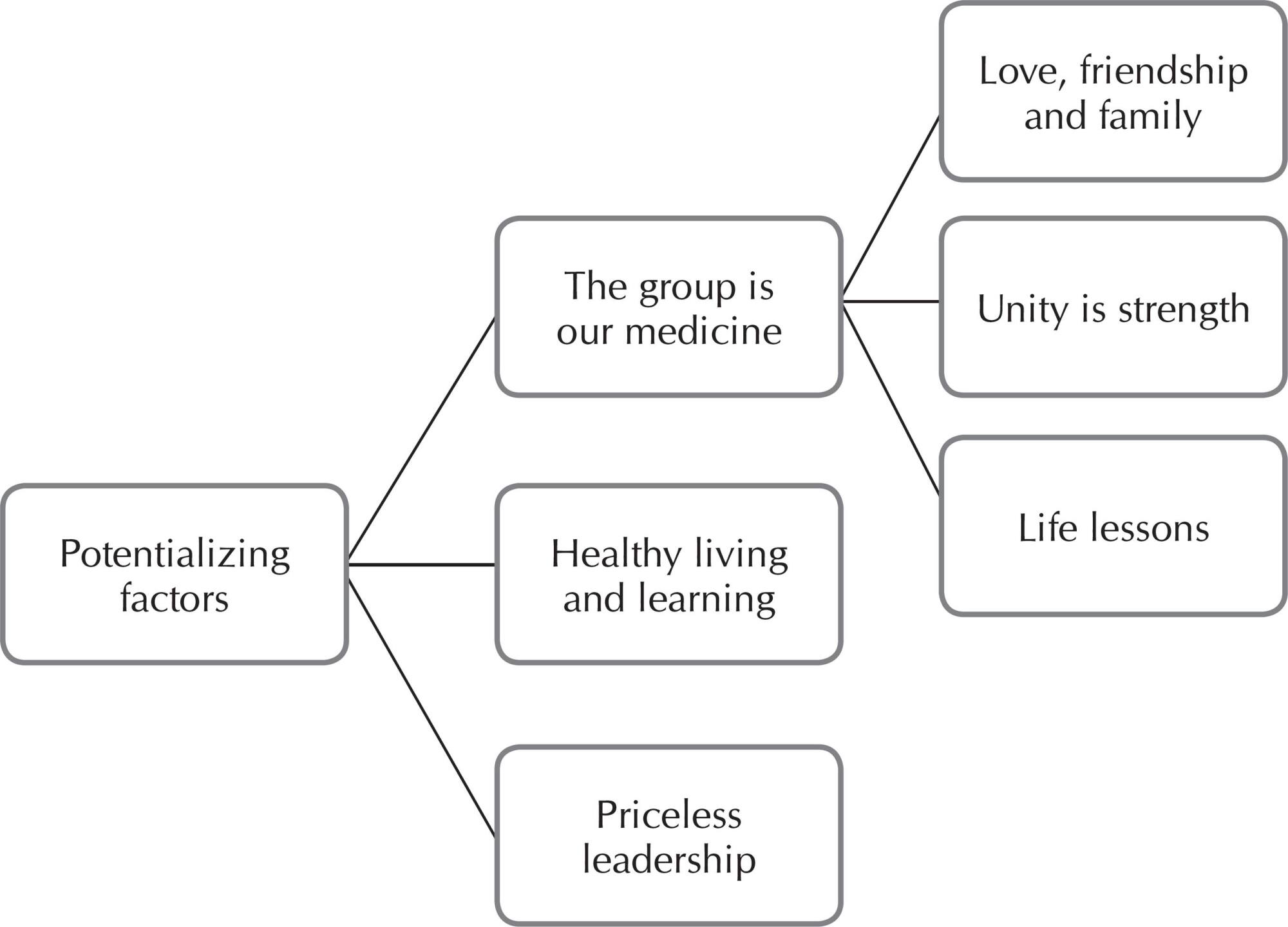-
ORIGINAL ARTICLE
Effectiveness of therapeutic groups in psychosocial care: analysis in the light of yalom’s therapeutic factors
Revista Brasileira de Enfermagem. 2020;73(Suppl 1):e20200410
12-04-2020
Resumo
ORIGINAL ARTICLEEffectiveness of therapeutic groups in psychosocial care: analysis in the light of yalom’s therapeutic factors
Revista Brasileira de Enfermagem. 2020;73(Suppl 1):e20200410
12-04-2020DOI 10.1590/0034-7167-2020-0410
Visualizações0ABSTRACT
Objective:
to describe professionals’ perceptions about the therapeutic effectiveness of group care.
Method:
a descriptive, exploratory, qualitative research of the type of intervention carried out with 30 professionals from Psychosocial Care Centers for Alcohol and Drugs in a municipality in center-westerns Brazil, from March to April 2019. Self-applicable instruments and round circles were used. The emerging data were submitted to content analysis.
Results:
professionals perceive the benefits of group practices and relate them to some therapeutic factors in the group. It is evident the little formal and systematized knowledge about the group process elements.
Final Considerations:
the therapeutic effectiveness of group processes is compromised due to absence of systematic records that allow to perceive the therapeutic progress of users, even though professionals perceive the emergence of therapeutic factors of the groups in the context of psychosocial care.
Palavras-chave: Community Mental Health ServicesEffectivenessGroup ProcessesHealth PersonnelMental HealthVer mais -
PESQUISA
Quality of life assessment for health promotion groups
Revista Brasileira de Enfermagem. 2016;69(2):242-249
01-01-2016
Resumo
PESQUISAQuality of life assessment for health promotion groups
Revista Brasileira de Enfermagem. 2016;69(2):242-249
01-01-2016DOI 10.1590/0034-7167.2016690206i
Visualizações0Ver maisABSTRACT
Objective:
to analyze the use of quality of life assessment (QOL) as a strategy to evaluate the work with health promotion groups in the community.
Method:
cross-sectional, descriptive and analytical study. Participants of two elderly groups (n=46) were individually interviewed to fill the sociodemographic instruments, WHOQOL-BREF and WHOQOL-OLD.
Results:
the participants were women with up to 79 years, who did not live with a partner, with up to four years of study, retired, with individual income of up to a minimum salary. The mean scores on the WHOQOL-BREF were higher on "Social Relations" and lower in the "Environment". For the WHOQOL-OLD, the highest scores were achieved in facets "Social Participation" (G1) and "Past, Present and Future Activities" (G2), while "Death and Dying" facet obtained lower scores in both groups.
Conclusion:
the assessment of QOL appears to be useful in helping to identify the coordination aspects of life of elderly people that need to be better developed in groups.
-
PESQUISA
Leads for potentializing groups in Primary Health Care
Revista Brasileira de Enfermagem. 2016;69(5):964-971
01-01-2016
Resumo
PESQUISALeads for potentializing groups in Primary Health Care
Revista Brasileira de Enfermagem. 2016;69(5):964-971
01-01-2016DOI 10.1590/0034-7167-2015-0102
Visualizações0ABSTRACT
Objective:
to analyze the aspects that potentialize groups in Primary Health Care according to their coordinators and participants.
Method:
This is a descriptive study with a qualitative approach, conducted with a health promotion group affiliated with a Family Health Unit. The data were collected by means of focus groups with participants and community workers who were submitted to thematic content analysis.
Results:
the analysis gave rise to three thematic categories: The group is our medicine; Healthy living and learning; and Priceless leadership.
Conclusion:
the leads identified during the study were as follows: group organization involves investment in motivation and leadership by the coordinators; production of grouping and cohesion is a result of participants and coordinators meeting together, interspersed with dialog, things said and left unsaid that the subjects expressed in the group dynamic; the sense of belonging guarantees their placement in the group based on the recognition of their knowledge and affective, social and health needs.
Palavras-chave: Group ProcessesGroup StructureHealth PromotionNursing in Community HealthPrimary Health CareVer mais



